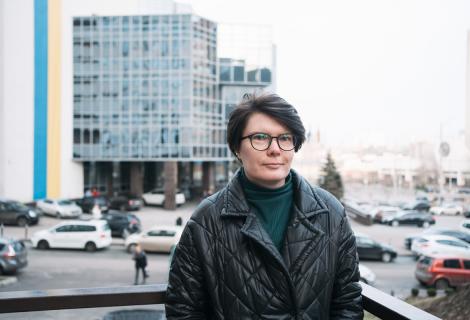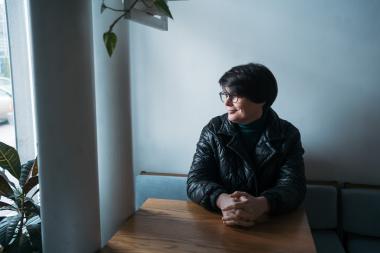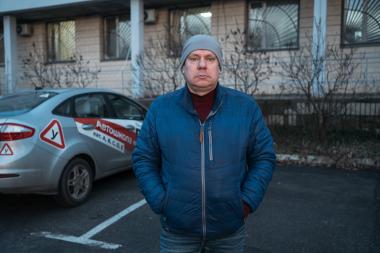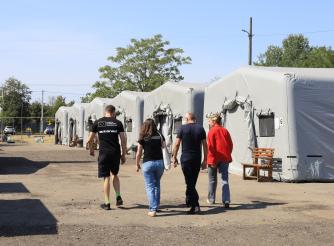Ukraine One Year On: Olha’s story

On 24 February 2022, Russia invaded Ukraine. As a result, thousands of people have died, and millions more have been displaced by the conflict. We’re continuing to work with partners in Ukraine, Moldova, Poland, and Romania to support those affected. One of these partners is Girls (Дівчата) who support women and girls who have been impacted by the war. Olha is just one of these women, and she spoke to us about her experiences over the past year.
“I had a good, beautiful life before the war. And the war, it highlights priorities, and well, it changes, it changes absolutely everything. It takes away a lot. From the other point of view, you start to appreciate… Well, it's a bit surprising, but the fact that you are alive still. The fact that you may open your eyes in the morning and live till the end of the day.”

Olha told us that at the beginning of the war, when it was clear she needed to evacuate with her children and leave her husband behind to fight, she realised that not being able to drive meant she couldn’t simply leave. Her husband was the driver in the family, and she was happy being a passenger, and had not gotten a driving license.
“I had no dreams or any plans to drive a car, but the life makes us adjust our plans. [When] you want to evacuate your children… [but] you cannot do that because you can only, probably, push this car to make it move (laughing). Nothing more. [It was] such a sign when I understood that ... I have transport, I have a wish, and there is a possibility to ensure safety for children, but I have no possibility because I do not know how to drive this transport.”
Olha told us that at the beginning of the war, when it was clear she needed to evacuate with her children and leave her husband behind to fight, she realised that not being able to drive meant she couldn’t simply leave. Her husband was the driver in the family, and she was happy being a passenger, and had not gotten a driving license.
“I had no dreams or any plans to drive a car, but the life makes us adjust our plans. [When] you want to evacuate your children… [but] you cannot do that because you can only, probably, push this car to make it move (laughing). Nothing more. [It was] such a sign when I understood that ... I have transport, I have a wish, and there is a possibility to ensure safety for children, but I have no possibility because I do not know how to drive this transport.”
Since fleeing their home, Olha is learning to drive with help from Girls, and has now passed the theory portion of her license. She talked about how women have carried larger social burdens with jobs, housekeeping, and childcare all piling on top of each other. She also talked about the exhaustion faced by those who fled their homes in this war.
“They stopped to sleep. They started to cry. And I understand them very well. Not only children. The adults stopped to sleep and started to cry as well.”

Dmytro Rohanov is a driving instructor. Before the war, he would teach people from all walks of life, but found that mainly women would come to him for training. He now trains women to drive with Girls. He told us that when the war started, he found more women needed to learn to drive; men (who were the drivers in families like Olha’s) had to stay to fight, and women were needing to evacuate with children.
Dmytro told us about how driving was sometimes seen as gendered in Ukraine, with it being assumed that driving was a ‘natural-born instinct’ for men. However, he tries to motivate his students with stories of women who have driven their families to safety, and how when there is a strong motivation, people are more capable than they think.
“The myths that men are born in car with steering wheel and pedals. The key word here is myth. First, we are equal, the men and women. Second, women learn the art of driving similarly to men. They learn the traffic rules in the same way. And, observing these rules, we are equal as well. The girls learn in the same way, and, maybe, in many cases respond, take the decisions better on the road in many situations. A young girl evacuated the family, having no driving license, with her both legs wounded. And I give this example to many of my pupils. There was a wish, there was a strong motivation, and the girl was capable.”


